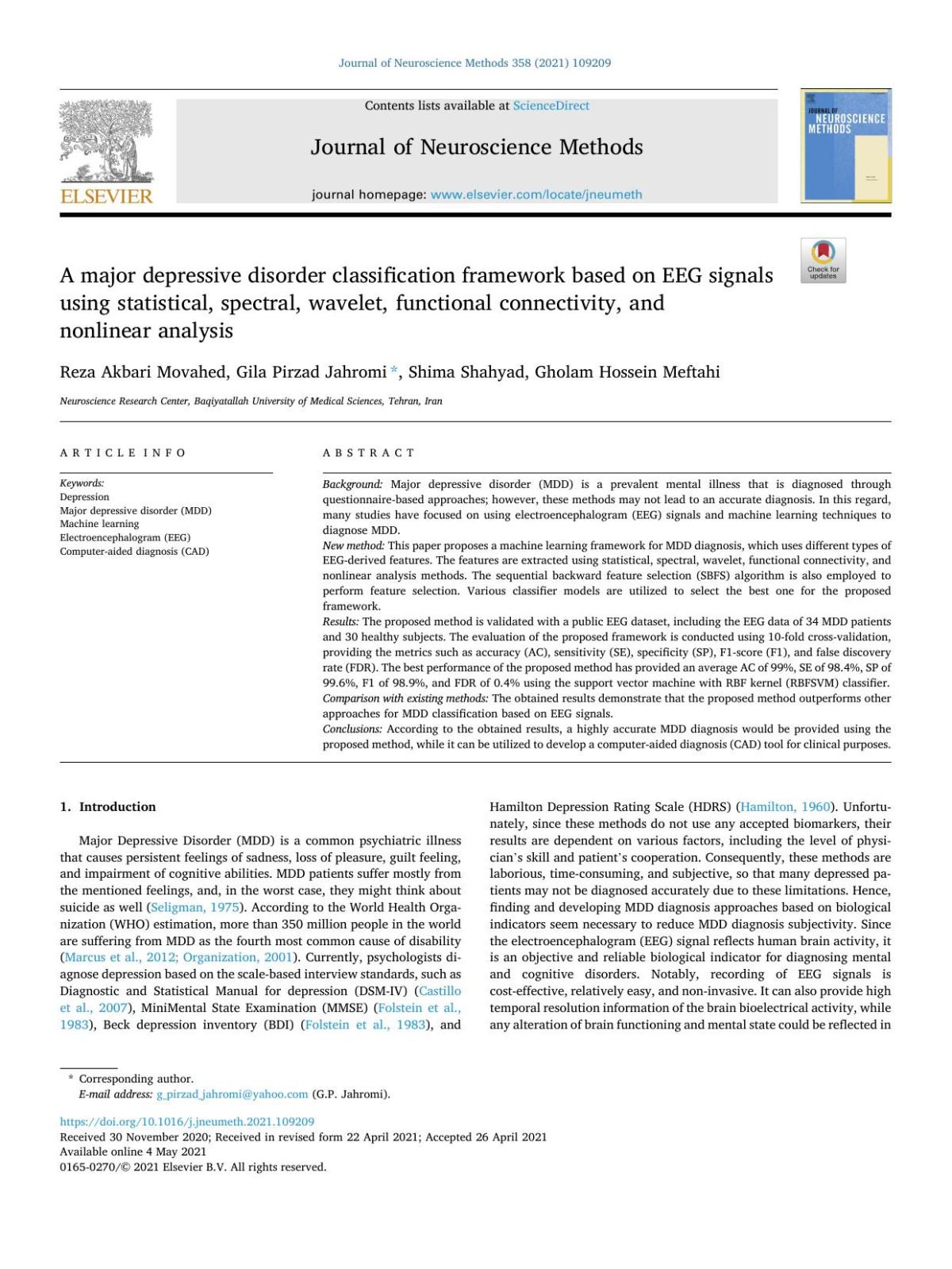ListofContributors
FariyaAli,BS,MD ResidentPhysician Psychiatry UniversityofMiamiMillerSchoolofMedicine DepartmentofPsychiatry Miami,FL,UnitedStates
AliBani-Fatemi,PhD CentreforAddictionandMentalHealth(CAMH) Toronto,ON,Canada
IsabelleE.Bauer,PhD AssistantProfessor
UniversityofTexasHealthScienceCenteratHouston McGovernMedicalSchool DepartmentofPsychiatryandBehavioralSciences Houston,TX,UnitedStates
BernhardT.Baune,PhD,MD,MPH,FRANZCP FloreyInstituteofNeuroscienceandMentalHealth MelbourneBrainCentre UniversityofMelbourne Melbourne,VIC,Australia DepartmentofPsychiatry MelbourneMedicalSchool UniversityofMelbourne Melbourne,VIC,Australia DepartmentofPsychiatry UniversityofMünster Münster,Germany
VenkatBhat,MD,MSc,FRCPC,DABPN DepartmentofPsychiatry SunnybrookHealthSciencesCentre Toronto,ON,Canada
JustinN.Chee,PhD(c),MSc,HonBSc ResearchStaff
Psychiatry SunnybrookHealthSciencesCentre Toronto,ON,Canada
AmyCheung,MD,MSc,FRCP(C) AssociateProfessor
Psychiatry UniversityofToronto
SunnybrookHealthSciencesCentre Toronto,ON,Canada
AlexandriaS.Coles,BA ResearchAssistant MoodDisordersPsychopharmacologyUnit TorontoWesternHospital UnitedHealthNetwork Toronto,ON,Canada
TimothyM.Cooper,MD ResidentPhysician Psychiatry,NYUSchoolofMedicine NewYork,NY,UnitedStates
OluwagbengaO.Dada,BSc CentreforAddictionandMentalHealth(CAMH) Toronto,ON,Canada
VincenzoDeLuca,MD,PhD CentreforAddictionandMentalHealth(CAMH) Toronto,ON,Canada
Doctor
Psychiatry UniversityofToronto Toronto,ON,Canada
ErinC.Dunn,ScD,MPH AssistantinResearch PsychiatricandNeurodevelopmentalGeneticsUnit CenterforGenomicMedicine
MassachusettsGeneralHospital Boston,MA,UnitedStates
AssistantProfessor DepartmentofPsychiatry
HarvardMedicalSchool Boston,MA,UnitedStates
PeterGiacobbe,MD,MSc,FRCPC DepartmentofPsychiatry UniversityofToronto Toronto,ON,Canada
DepartmentofPsychiatry SunnybrookHealthSciencesCentre Toronto,ON,Canada
FacultyofMedicine UniversityofToronto Toronto,ON,Canada
ArielGraff,MD,PhD CentreforAddictionandMentalHealth(CAMH) Toronto,ON,Canada
TracyL.Greer,BA,MS,PhD,MSCS AssociateProfessor DepartmentofPsychiatry UTSouthwesternMedicalCenter CenterforDepressionResearchandClinicalCare Dallas,TX,UnitedStates
DanV.Iosifescu,MD,MSc AssociateProfessorofPsychiatry Psychiatry NYUSchoolofMedicine NewYork,NY,UnitedStates DirectorofClinicalResearch
NathanS.KlineInstituteforPsychiatricResearch Orangeburg,NY,UnitedStates
JeethuK.Joseph,BS ClinicalDataSpecialist DepartmentofPsychiatry UTSouthwesternMedicalCenter CenterforDepressionResearchandClinicalCare Dallas,TX,UnitedStates
JungjinKim,MD AddictionPsychiatryFellow HarvardMedicalSchool Boston,MA,UnitedStates
YenaLee,HBSc MoodDisordersPsychopharmacologyUnit TorontoWesternHospital UnitedHealthNetwork Toronto,ON,Canada
RogerChunManHo,MD,MRCPsych,FRCPC AssociateProfessorandSeniorConsultant DepartmentofPsychologicalMedicine NationalUniversityofSingapore Singapore,Singapore
RogerS.McIntyre,MD,FRCP(C) Head
MoodDisordersPsychopharmacologyUnit TorontoWesternHospital UnitedHealthNetwork Toronto,ON,Canada
Professor DepartmentofPsychiatry UniversityofToronto Toronto,ON,Canada
DepartmentofPharmacology UniversityofToronto Toronto,ON,Canada
TomasMelicher,MD Resident Psychiatry UniversityofTexasHealthScienceCenteratHouston McGovernMedicalSchool DepartmentofPsychiatryandBehavioralSciences Houston,TX,UnitedStates
YingMeng,MD DepartmentofPsychiatry SunnybrookHealthSciencesCentre Toronto,ON,Canada
DepartmentofNeurosurgery UniversityofToronto Toronto,ON,Canada
KarimMithani,M.Eng DepartmentofPsychiatry SunnybrookHealthSciencesCentre Toronto,ON,Canada
MarcellinoMonda,MD UniversityofCampaniaVanvitelli Naples,Italy
CharlesB.Nemeroff,MD,PhD DepartmentofPsychiatry UniversityofTexasatAustin DellMedicalSchool Austin,TX,UnitedStates
RoyH.Perlis,MD,MSc CenterforQuantitativeHealth MassachusettsGeneralHospitalandHarvard MedicalSchool Boston,MA,UnitedStates
ArvindRajagopalan,MBBS InstituteofMentalHealth Singapore,Singapore
JoshuaD.Rosenblat,BSc,MD ResidentofPsychiatry UniversityofToronto Toronto,ON,Canada
MarsalSanches,MD,PhD AssociateProfessor DepartmentofPsychiatryandBehavioralSciences UniversityofTexasHealthScienceCenteratHouston McGovernMedicalSchool Houston,TX,UnitedStates
ThomasL.Schwartz,MD Professor DepartmentofPsychiatry SUNYUpstateMedicalUniversity Syracuse,NY,UnitedStates
GauravSinghal,M.Trop.V.Sc.,B.V.Sc. & A.H. PsychiatricNeuroscienceLab DisciplineofPsychiatry UniversityofAdelaide Adelaide,SA,Australia
JairC.Soares,MD,PhD ProfessorandChairman UniversityofTexasHealthScienceCenteratHouston McGovernMedicalSchool DepartmentofPsychiatryandBehavioralSciences Houston,TX,UnitedStates
MehalaSubramaniapillai,MSc MoodDisordersPsychopharmacologyUnit TorontoWesternHospital UnitedHealthNetwork Toronto,ON,Canada
SamiaTasmim,MSc CentreforAddictionandMentalHealth(CAMH) Toronto,ON,Canada
KarenWang,MD,MEd,FRCP(C) AssistantProfessor Psychiatry UniversityofToronto SunnybrookHealthSciencesCentre Toronto,ON,Canada
KevinZ.Wang,BSc CentreforAddictionandMentalHealth(CAMH) Toronto,ON,Canada
Min-JungWang,ScD GraduateStudent PsychiatricandNeurodevelopmentalGeneticsUnit CenterforGenomicMedicine MassachusettsGeneralHospital Boston,MA,UnitedStates
HanjingWu,MD,PhD AssistantProfessor UniversityofTexasHealthScienceCenteratHouston McGovernMedicalSchool DepartmentofPsychiatryandBehavioralSciences Houston,TX,UnitedStates
Preface
Globally,majordepressivedisorder(MDD)debases braincapitalmorethananyothermedicaldisorder. Thehighincidenceandprevalencerate,aswellasthe earlyageofonset,lowratesofrecovery,andhighrates ofcomorbidityaccountfortheextraordinarylossof rolefunction,andassociatedeconomiccosts.Thereis norace,ethnicordemographicgroup,country,and/or culturethatisimmunefromthehazardsofMDD.
TheforegoingportraitofMDDthatIhavesketched earlierisaverydifferentportraitthanwassketchedas recentlyas2decadesago,whereinatthattime,MDD wasthoughttobearelativelymildconditionwith mostindividualsrecoveringandreturningtonormal life “trajectory.” Theepidemiologictransitionhasshiftedpolicy,publichealth,andclinical/researchattentionandresourcestowardnoncommunicabledisorders (NCD).Majordepressivedisorderisthemostcommon NCDofyoungpeopleandisassociatedwithpremature agingandshorterlifespan.Neurobiologicresearch indicatesthattheunderlyingpathogenesisofNCDsis overlappingprovidingaconceptualframeworkforwhy individualswithMDDaredifferentiallyaffectedby manyotherNCDs(e.g.,obesity,cardiovasculardisease, diabetes).
ThefutureofMDDresearchwillbeguidedbythe principleof “disaggregation. ” WhatImeanbythisis thatthesyndromeofMDDcomprisesagglutinated dimensionsthatarebothoverlappinganddiscretein pathoetiology.Forexample,newtreatmentsare requiredforgeneralcognitivedysfunctioninMDD. Thereisalsoanurgentneedfornoveltreatmentsfor disturbancesineithermotivationand/orreward dysfunctioninMDD;criticalunmetneedsinmost individualsaffectedbythisdisorder.Anadditional viableandvaluabletreatmentforadultswithMDD wouldbetreatmentsthatrobustlyandmeaningfully improvethechronobiologicalalterations.This incompletesetofdisaggregatedtargetscomportswith thebiobehavioralmatrixprofferedbytheUSNIHthe ResearchDomainCriteria(RDoC).Psychiatrywillnot developgenuinelynoveldiseasemodifyingand/or curativetherapiesthatareimpactfulandscalableby
lookingfor “biomarkers” thatcorrelatewithtreatment responsetoconventionalantidepressants(e.g.,selectiveserotoninreuptakeinhibitorsSSRIs)diagnosed withMDDaccordingtoDSM-5.0.Clearly,amore sophisticatedandbiologicallyinformeddiseasemodel isrequired.
Therearemanymetaphorsthataresuggestedasa guidinglessonforpsychiatry,includingbutnotlimited tometabolicsyndrome.Forexample,itiswellknown thatobesity,dyslipidemia,dysglycemia,andhypertensionco-occurataratemuchhigherthanchance becauseofsharedpathogenesis.Notwithstanding, parsingeachphenotypeseparatelyhasresultedinsome majorbreakthroughsinpharmacologictreatmentfor severalofthesedimensionsthatcanbeusedincombinationinpersonspresentingwithmulticomponent metabolicsyndrome.ForMDD,thereisaneedtofully characterizetheneurobiologythatsubservesthe discretedimensionswithanaimtomoveawayfrom exclusivesymptomsuppressionapproachestoward diseasemodificationandcure.
Computationalneuroscience,aswellasadvancesin informatics,hasgivenusacapabilitythatislimited onlybyourknowledgeofwhichvariablesshouldbe interrogated.Itseemsveryreasonablethatusingartificialintelligencemachinelearning,weshouldbeable tofullycharacterizemuchoftheoperatingcharacteristicsofneuralnetworksandcriticalintracellularcascadeswithinneuronsandgliathatarealteredin individualswithMDD.Themonoaminergichypothesis hasprovidedusarathersurprisingnumberofsuccess storiesgivenitsserendipitousbackground.Future treatmentdiscoveryanddevelopmentwillbeguided bydiseasemodelsthatfocusonkeytargetsincluding, butnotlimitedto,aminoacids(e.g.,glutamate, GABA),immunoinflammatorysystems,mitochondrial biogenesis,oxidativestress,neurotrophicsystems,and opioidergics.
PsychosocialmodalitiesoftreatmentforMDDwill befurtherrefinedandsubjecttomorerigorousstudy (e.g.,exerciseandcomputer-basedmanualizedpsychotherapy),aswellasneurostimulatoryapproaches.
Fromapopulationhealthperspective,greateremphasis onthepreventionand “immunization” fromMDDis warranted(andalreadyexistsinsomemodalities!) (e.g.,population-basedexercise).Itisconcerningthat manysocialdeterminantsofMDDcontinuetobe enduringproblemsfortheglobalpopulation(e.g.,incomeinequality,wagestagnation,housingdislocation, obesity,exposuretoinfectiousagents).
Takentogetherwhattheforegoingimpliesisthat theneuroscienti ficadvancesregardingthecausesand curesofMDDneedtobeyokedtopublicpolicy changesthattargetkeysocialdeterminants.Thedigital economyhasprovidedtremendousopportunitywith respecttotheprovisionofmentalhealthcare,aswellas toguidetreatmentdiscoveryanddevelopment.A negativeexternalityofthedigitaleconomyhoweverhas beenfeltinboththepublicsquare(e.g.,automation andworkplacedislocation),aswellasmoderatingto someextentsocialsupportand/orsocialnetworks (whichmaybeprotectiveand/oravulnerabilityfactor toMDD).Weneedtomakethedigitaleconomya “bull” marketforourpatientsbeginningwith
appreciatingthenegativeexternalitiesandmitigating themasmuchaspossible,andexploitingthepositive externalities.
Inthistextbook,Ihaveinvitedinputfromglobal expertswhohavemadeindependentandsubstantive contributionstotheareaofMDD.Ipurposelysought outindividualswhoIhaveidentifiedasscholarswho bringprescience,perspicacity,academicscholarship, andpragmatismtotheresearch.Theaimistoprovide readerswithaStateoftheUniononMDDfrom mechanismstomanagementwithaviewtoprovidea lineofsightforthefuture.Itisobviousthatboththe researchandclinicalcommunityinMDDneedsto supplantincrementalismwithsaltatoryleapsforward. Ithankalloftheauthorsfortheircontribution. Iparticularlywanttothankallofthepatientsand familiesthatIhavemetthroughoutmycareerthathave givenmeincredibleprivilege,incrediblepurpose,and callinginmylife,andhaveinspiredmeto findcures (whichwewill)forMDD.
RogerS.McIntyre
ASummaryofRecentUpdatesonthe GeneticDeterminantsofDepression *
ERINC.DUNN,SCD,MPH • MIN-JUNGWANG,SCD • ROYH.PERLIS,MD,MSC
INTRODUCTION
Withlifetimeprevalenceestimatesof6.2%among adolescents1 andupto19%2 amongadults,major depressivedisorder(MDD)isoneofthemostcommon, costly,anddisablingmentalhealthconditions worldwide.3 Itsonsetistypicallyearlyinlife,with mostindividuals firstexperiencingdepressionduring adolescence.4 Itisalsoahighlyrecurrentdisorder, withnearlythreequartersofpeoplewithMDDexperiencingasecondepisodeatsomepointintheirlives.5 Depressioncontributessubstantiallytoexcessmortality,eitherdirectlythroughsuicideorindirectlythrough comorbidchronicconditions,6 increasingmortalityrisk by60% 80%.7,8 Theassociatedlossinproductivity andyearsoflifelivedwithdisabilityduetoMDDalso impactssocietyasawhole.9,10 Forthesereasons, depressionisprojectedtobe the leadingcauseofdisease burdenworldwideby2030.11
Effortstounderstandthewaysinwhichgenesand experienceworkinconcerttoshaperiskfordepression acrossthelifetimewillbekeytoincreasingknowledge abouttheetiologyofthisdisorderandinformingefforts topreventandtreatit.Therearenownumerousenvironmentalriskfactorsfordepressionthatarewellestablished,includingpoverty,12,13 negativefamily relationshipsandparentaldivorce,14,15 childmaltreatment,16,17 andotherstressfullifeeventsmoregenerally.18,19 Althoughtheriskofdepressioniselevatedin theimmediateaftermathofexperiencingtheseenvironmentaladversities,theeffectsofadversitycanpersist overthelifecourse.20,21 Indeed,theseenvironmental
*Supported,inpart,bytheHarvardUniversityCenteronthe DevelopingChild(Dr.Dunn)andbyNationalInstituteof MentalHealthgrantnumbers:K01MH102403(Dr.Dunn), R01MH113930(Dr.Dunn),R56MH115187(Dr.Perlis),and R01MH116270(Dr.Perlis).ThecontentissolelytheresponsibilityoftheauthorsanddoesnotnecessarilyrepresenttheofficialviewsoftheNationalInstitutesofHealth.
MajorDepressiveDisorder. https://doi.org/10.1016/B978-0-323-58131-8.00001-X Copyright © 2020ElsevierInc.Allrightsreserved.
riskfactorshavebeenfoundtoatleastdoubletherisk ofyouth-andadult-onsetmentaldisorders.22 24 Evidenceisalsobeginningtosuggestthattheremaybe “sensitiveperiods,” particularlyduringthe first5years oflife,whenexposuretotheseadversitieshasmore detrimentalinfluencesontheriskofdepression.For example,priorstudieshaveshownthatindividuals exposedtochildmaltreatment, financialinstability,or actsofinterpersonalviolenceduringearlychildhood haddepressiveorotherpsychiatricsymptomsthat wereuptotwiceashighasthosewhowere firstexposed totheseadversitiesduringmiddlechildhood,adolescence,oradulthood.21,25,26
Itisalsoclearthatgeneticvariationconfersriskfor depressionandotherpsychiatricdisorders.MDDis knowntoruninfamilies;peoplewiththisdiagnosis arethreetimesmorelikelythanthosewithoutthedisordertohavea first-degreerelativewhoalsohasdepression.27 (Notably,theyarealsomorelikelytohave familymemberswithotherneuropsychiatricdisorders, includingbipolardisorder.)Twinstudies,whichallow forthesimultaneousquantificationofgeneticandenvironmentalinfluences,suggestthatdepressionismoderatelyheritable.Specifically,twinstudiescomparing monozygotic(identical)anddizygotic(fraternal)twins haveestimatedthatapproximately40%ofthevariation inthepopulationriskofMDDisattributabletogenetic variation.28
Foroveradecade,thecombinationofadvancesin ourunderstandingofhumangenomicvariation(e.g., HumanGenomeProject,29 HapMapProject,30 1000 GenomesProject31)andcost-effectivegenotypingtechniqueshaveledtounprecedentedgrowthinmolecular geneticstudiesofdepressionandother “complex” psychiatricphenotypes.Thesestudiestypicallyexamine whetherspecific alleles,meaningalternativeformsof DNAsequenceataspecificlocus,or genotypes,meaning thecombinationofallelesatagivenlocus,areassociatedwiththephenotypeofinterest.Asastartingpoint,
moleculargeneticstudiesofdepressionfocusedlargely oncandidategenes thatis,genesthatarehypothesizedtobeimplicatedintheneurobiologyofdepression.Someofthemostcommonlystudiedcandidate geneswerethoseregulatingserotonin(5-HT)anddopamineneurotransmission,giventhesuspectedinvolvementoftheseneurotransmittersinthe pathophysiologyofdepressionandtheirroleastargets ofantidepressantdrugs.32 34 However,thelackof reproducibilityofthesestudiesledthe fieldtoinstead focusongenome-wideassociationstudies(GWAS), whichadoptan unbiased approachthatallowsfora hypothesis-freeanalysisofamillionormorecommon variants(knownassinglenucleotidepolymorphisms (SNPs))acrosstheentiregenome.Theultimategoal ofGWASistoincreaseunderstandingofthegeneticbasisofdepression,includingthemechanismsthatgive risetothedisorder,recognizingthatatpresentthere arenostronghypothesesaboutsuchmechanismsto guidefocusedgeneticstudy.Withgreaterinsightsinto thegeneticetiologyofMDD,itmaybepossibletoidentifyindividualsatgreatestriskfordepression,develop noveltreatmenttargetsforthedisorder(forbothpreventionaswellastreatment),andtailorthosetargets inwaysthatmaximizeindividualbenefit;suchefforts toimprovediagnosis,prevention,andtreatmentare consistentwiththegoalsofprecisionmedicine.35
Inthischapter,wereviewrecent fi ndingsfromgeneticassociationstudiesandG Estudiesrelatedto depression,andoutlinesomeofthechallengesfor futureresearch.Sinceapriorsummaryofthisresearch publishedin2015,37 severalkeydiscoverieswarranta reconsiderationofthisexpandingliterature.Aswe describelater,suchdevelopmentsincludeeverlarger collaborativeconsortia,whichhaveenabledidenti fi cationofnovelvariantsassociatedwithdepression;aggregationofindividualvariantstoaccountforthe polygenicityofdepression;andintegrationofsystems
biologyvianetworkandpathwayanalyses. 38,39 This summaryisintendedtobeinterpretablebynonspecialistswhomaybeunfamiliarwithgeneticconcepts andmethods.Inthe fi rstsection,weprovideupdates fromthepast3yearsemergingfromGWASofdepressionandotherworktoidentifythegeneticbasisof depression.Inthesecondsection,wesummarize recent fi ndingsfromG Estudies,whichaimtosimultaneouslyexaminetherespectiverolesofgeneticvariantsandenvironmentalexposuresintheetiologyof depression.Asdescribedlater,G Estudieshavethe potentialtohelpidentifygeneticvariantsassociated withboththeriskof,andresilienceagainst, depression whicharerevealedonlyinspeci fi csubgroupsofthepopulationthathaveexperiencedagiven environment.Inthethirdsection,weaddressthechallengesthatfacegeneticstudiesofdepressionand describeemergingstrategiesthatmaybeusefulfor overcomingthesechallenges.
FINDINGSFROMGENETICASSOCIATION STUDIES
ResultsFromGenome-WideAssociation Studies
Asnotedpreviously,GWAShavebeenoneofthemost widelyusedmethodstoidentifygeneticrisklociinthe pastdecade.40 42 AnoverviewofGWASisprovidedin Table1.1.
Oneofthemostimportantlessonsemerging fromGWASperformedstartingintheearlyandmid 2000s whetherfordepressionandothercomplex diseases wasthattheeffectofmostvariants and SNPsinparticular wassmallinmagnitude,with resultssuggestingallelicoddratiosofaround1.3or less.These findingsmeantthatverylargesamples on theorderoftensofthousands,ifnothundredsof thousands wouldbeneededtoidentifygeneticrisk
TABLE1.1
• Inatypicalgenome-wideassociationstudy,onemillionormorecommonvariantsknownassinglenucleotide polymorphisms(SNPs)areexaminedfortheirassociationtodisease.
• Commonriskvariantsaregenerallydefinedasthoseallelescarriedbyatleast5%ofthepopulation.
• GWASaretypicallyconductedusingacase-controldesigninwhichallelefrequenciesarecomparedbetweencaseswith depression,forexample,tocontrolswithoutthedisease.
• ToaccountforthelargenumberofstatisticaltestsconductedinaGWAS,thethresholdfordeclaringgenome-wide significanceisa P-valueoflessthan5 10 8,whichisequivalenttoa P-valueof0.05thathasbeencorrectedfora millionindependenttests(P < 0.00000005).a
• Becausecommonvarianteffectsaretypicallymodest,largesamples(intheorderof10,000ormorecasesandcontrols) areusuallyneededtohavesufficientpowertodetectsucheffectsatthisstatisticalthreshold.
a AdaptedfromPearsonTA,ManolioTA.Howtointerpretagenome-wideassociationstudy.JournaloftheAmericanMedicalAssociation2008; 299:1335 44.
lociassociatedwithdepression.Toachievesuchlarge samples,individualgroupswererequiredtowork togethertoformlargecollaborativeconsortia,rather thanworkingsolelyontheirown.
Inoneofthemostwell-knownexamplesofsuch collaborationefforts,thePsychiatricGenomicsConsortium(PGC)wasestablishedin2007asaninternationalcollaborativeefforttodefinethespectrumof riskvariantsacrosspsychiatricdisorders(http://www. med.unc.edu/pgc/).Oneoftheconsortium’smajorgoals hasbeentoconductmega-analysesforMDDaswellas autism,attention-deficit/hyperactivitydisorder,bipolar disorder,schizophreniaandotherdisorders.43 45 Ina mega-analysis,researcherspoolindividual-levelphenotypeandgenotypedatafromacrossmanystudies;this approachdiffersfromameta-analysis,wherethesummarystatisticsproducedbyeachstudyareanalyzed.In 2012,theConsortiumpublishedtheresultsofaGWAS mega-analysisofMDDcomprising9240casesand 9519controlsacrossnineprimarysamples,allofEuropeanancestry.46 Althoughthissamplewasthelargest todate,noSNPreachedgenome-widesignificance. Aroundthesametime,large-scaleeffortstoexamine depressivesymptomswerealsonotidentifyinggenetic variantslinkedtodepression.Forexample,eveninthe largeststudyconductedatthattime,whichwasa meta-analysiscomprising17population-basedstudies (n ¼ 34,549individuals)asthediscoverysample no SNPreachedgenome-widesignificance. 47
Aftermanyyearsofeffort,GWASofdepressionhave begunmakingprogress,assummarizedinthereviewof resultsshownin Table1.2.In2015,researchersreportedthe firsttwogeneticvariantsassociatedwith depression.Thesetwolociweredetectedinasample ofChinesewomenwithrecurrentMDD.48 OneSNP (rs12415800)wasnearageneinvolvedinmitochondrialbiogenesis(SIRT1),whiletheother (rs35936514)wasnearthe LHPP gene,whichhas beenfoundtoinfluenceregionalbrainactivity.49
In2019,Howardandcolleagues57 presentedresults fromthelargestgenome-widemeta-analysisofdepressiontodate(n ¼ 807,553),whichincludedparticipantsfromthethreelargestGWASofdepression publishedbetween2016and2018:23andme,50 UK Biobank,58 andPGCcohorts.59 Thestudyyielded severalimportant findings.First,102independentgeneticvariants,ofwhich87weresignificantinanindependentreplicationsample,wereassociatedwith depression.Resultsfromthegene-basedanalysessuggestedthatputativegenesassociatedwithdepression mayinfluencebiologicalpathwaysrelatedtosynaptic functioningandstimuliresponse.Furthermore,partitionedheritabilityanalysisrevealedtheimportanceof prefrontalbrainregionsinthepathophysiologyof depression.Notably,therewassignificantgeneticoverlapbetweendepressionandotherpsychiatricdisorders (e.g.,schizophrenia,bipolardisorder),providingadditionalevidencethatthecurrentpsychiatricclassification systemdoesnotadequatelydistinguishbetween distinctpathologicalmechanisms,thusillustratingthe needtorefinepsychiatricdiagnoses.Overall,theresults ofthisgenome-wideassociationstudyprovidenovel insightsintotheneurobiologicalbasisofdepression andhintatpotentialnewopportunitiesforpharmacologicalinterventions.
Ontheotherhand,severalchallengesininterpreting thesestudiesshouldbenoted.First,arguablythe conclusionofadecadeofgeneticinvestigationisthat MDDisabraindisease.Thatis,whileidentificationof riskvariantsinbrain-expressedgenesisreassuring,it isperhapsnotsurprising.Second,theappropriate phenotypeforinvestigationmeritsconsideration. Initialpublicationsusingbroaddepressionphenotypes, aswiththe23andmeresults,werecriticizedforalackof diagnosticprecision(i.e.,useoftraditionalmultihour clinicianassessments);however,themagnitudeofeffectsidentifiedinthesecohortsappearstohavebeen nodifferentfromstudiesusingmoretraditional methods.
Ashasbeenthecaseforpsychiatricgenetics60 andgeneticsresearch61 morebroadly,therehasbeenageneral
During2015and2016,another22variantswere identifiedwithinsamplesofEuropeanAmericanadults. Inthe firstsuchstudy,anadditional17lociacross15 regionswereidentifiedusing “crowd-sourced” data collectedbyconsumergenomicsplatforms.50 Inthis jointanalysisofthe23andmecohort(75,607individualswithself-reporteddepressionand231,747individualswithoutself-reportedhistoryofdepression)and PGCcohorts,thetoploci(rs10514299)detectedwas in TMEM161B-MEF2C,whichisexpressedinthebrain (TMEM161B)51 andhasbeenimplicatedinsynaptic functionregulation(MEF2C).52 Inameta-analysis andproxy-phenotypeanalysisacrossthreelarge cohorts,includingthePGC,UKBiobank,andthe ResourceforGeneticEpidemiologyResearchonAging, fournewlociweredetected.53 Inthisstudy,thetwolead SNPswerers7973260inthe KSR2 (kinasesuppressorof ras2)gene,andrs62100776inthe DCC gene,which encodesatransmembranereceptorinvolvedinaxon guidanceandhelpsestablishsynapticconnectivity.54,55 Finally,onenewlocuswasidentifiedthrougheffortsto examineabroaddepressionphenotypecomprisinglifetimeMDDanddepressivesymptoms.56
TABLE1.2
ResultsfortheSignificantLoci(P < 1 10 8)IdentifiedinPublishedGWASofDepression,ListedbyPublicationYear.
PublicationrsidCHRGenecontexta Effect P-valueTraitassociationsb
CONVERGE consortium,2015 rs3593651410LHPPOR ¼ 0.846.43E-12
CONVERGE consortium,2015 rs1241580010 OR ¼ 1.152.37E-10
Wareetal.,2015rs11272333MUC13 b ¼ 0.23823.85E-08
Direketal.,2016rs98258233FHIT
Hydeetal.,2016rs105142995TMEM161B-AS1
Hydeetal.,2016rs15183952VRK2
Hydeetal.,2016rs217974422CHADL;L3MBTL2
Hydeetal.,2016rs112099481LOC105378797
Hydeetal.,2016rs4542145
Hydeetal.,2016rs3018061RERE
Hydeetal.,2016rs14751206LIN28B-AS1;LIN28B
Hydeetal.,2016rs1078683110SORCS3
Hydeetal.,2016rs1255213OLFM4
8.20E-09Alcoholdependence(rs9825823,2.3E-05)
9.99E-16
4.32E-12Schizophrenia(rs2312147, <3E-07);Epilepsy (generalized)(rs2717068, <4E-07)
6.03E-11
8.38E-11BMI(rs2815752, <2.0E-22);obesity (rs2568958, <4.0E-16);obesity earlyonset (rs3101336, <2.0E-08);Subcutaneous adiposetissue(rs990871, <4.0E-06);weight (rs2568958, <2.0E-08);menarche(age-atonset)(rs3101336, <5.0E-13)
1.09E-09
1.90E-09Pelargonate(rs3795310,2.03E-5); 3-methoxytyrosine(rs301816,2.06E-05)
4.17E-09Menarche(age-at-onset)(rs314280, <2.0E14);pubertalanthropometrics (rs11156429, <2.00E-07);waist circumference(rs4946651,4.17E-08)
8.11E-09
8.16E-09Myo-inositol(rs12552,1.5E-05)
Hydeetal.,2016rs64766069PAX5 1.20E-08
Hydeetal.,2016rs802523115 1.23E-08
Hydeetal.,2016rs120655531 1.32E-08
Hydeetal.,2016rs16563693LOC100996447 1.34E-08
Hydeetal.,2016rs45432895 1.36E-08
Hydeetal.,2016rs212571612
3.05E-08Systemiclupuserythematosus(rs2125716, 1.13E-05)
Hydeetal.,2016rs24223211 3.18E-08
Hydeetal.,2016rs70441509CARM1P1 4.31E-08
Okbayetal.,2016rs797326012KSR2
Okbayetal.,2016rs6210077618DCC
Howardetal.,2018rs66997441
Howardetal.,2018rs30940546
Howardetal.,2018rs38078657TMEM106B
Howardetal.,2018rs1050169611GRM5
Howardetal.,2018rs404655RP11-6N13.1
Howardetal.,2018rs24022737
Howardetal.,2018rs953013913B3GLCT
Howardetal.,2018rs15545057MAD1L1
Howardetal.,2018rs75481511ASTN1
Howardetal.,2018rs109293552NBAS
Howardetal.,2018rs102136310SORCS3
Howardetal.,2018rs50114327TMEM106B
Howardetal.,2018rs2635759
Howardetal.,2018rs2854141915
Howardetal.,2018rs1101844911GRM5
Wrayetal.,2018rs1255213[OLFM4]; LINC01065,80099
b ¼ 0.0311.80E-09Neuroticism(rs7973260,2.40E-07)
b ¼ 0.0258.50E-09Neuroticism(rs62100776,5.43E-05); educationalattainment(rs62100776, 1.27E-05)
b ¼ 0.00611.64E-13
b ¼ 0.00611.79E-13Myastheniagravis(3.00E-71);idiopathic membranousnephropathy(9.47E-28); schizophrenia(2.35E-19);lungcancer (7.70E-14);type1diabetes(3.18E-09); triglycerides(1.43E-08);totalcholesterol (4.80E-06);triglycerides(6.59E-06)
b ¼ 0.00577.28E-12
b ¼ 0.00086.73E-11
b ¼ 0.00524.45E-10Educationalattainment(1.26E-05); triglycerides(6.18E-05)
b ¼ 0.00081.95E-09
b ¼ 0.00082.63E-09
b ¼ 0.00252.74E-09
b ¼ 0.00513.87E-09
b ¼ 0.00535.84E-09
b ¼ 0.00081.04E-08Schizophrenia(1.76E-05)
b ¼ 0.00092.23E-08
b ¼ 0.00082.31E-08
b ¼ 0.00082.78E-08
b ¼ 0.00084.52E-08
OR ¼ 1.046.10E-19Educationalattainment(4.59E-05)
Wrayetal.,2018rs14326391NEGR1,-64941OR ¼ 1.044.60E-15Educationalattainment(1.31E-06)
Wrayetal.,2018rs802523115 OR ¼ 0.972.40E-12
Wrayetal.,2018rs121295731LINC01360,-3486OR ¼ 1.044.00E-12Schizophrenia(2.0E-12)
Wrayetal.,2018chr5_103942055_D5 OR ¼ 1.037.50E-12
Wrayetal.,2018rs1155071226ExtendedMHCOR ¼ 0.963.30E-11Totalcholesterol(1.71E-05)
Wrayetal.,2018rs1295804818[TCF4];MIR4529,-44853OR ¼ 1.033.60E-11Inflammatoryboweldisease(2.02E-05)
Wrayetal.,2018chr5_87992715_I5LINC00461,-12095; MEF2C,21342 OR ¼ 0.977.90E-11
Wrayetal.,2018rs6186729310[SORCS3]OR ¼ 0.967.00E-10Schizophrenia(4.97E-06)
TABLE1.2
ResultsfortheSignificantLoci(P < 1 10 8)IdentifiedinPublishedGWASofDepression,ListedbyPublicationYear. cont'd
PublicationrsidCHRGenecontexta Effect P-valueTraitassociationsb
Wrayetal.,2018rs91505714[SYNE2];MIR548H1,124364;ESR2,7222
Wrayetal.,2018rs111353495
Wrayetal.,2018rs180615311[DKFZp686K1684]; [PAUPAR];ELP4,44032
OR ¼ 0.977.60E-10Educationalattainment(2.68E-05)
OR ¼ 0.971.10E-09
OR ¼ 1.041.20E-09
Wrayetal.,2018rs490473814[LRFN5]OR ¼ 0.972.60E-09
Wrayetal.,2018rs74305653[RSRC1]; LOC100996447,155828; MLF1,-181772
OR ¼ 0.972.90E-09Height(4.70E-10)
Wrayetal.,2018rs342159854[SLC30A9];LINC00682,163150;DCAF4L1,59294 OR ¼ 0.963.10E-09
Wrayetal.,2018rs1014947014BAG5,4927;APOPT1,11340 OR ¼ 0.973.10E-09Height(8.00E-09)
Wrayetal.,2018chr14_75356855_I14[DLST];PROX2,-26318; RPS6KL1,13801
OR ¼ 1.033.80E-09
Wrayetal.,2018rs116821752RK2,-147192OR ¼ 0.974.70E-09Schizophrenia(2.54E-12);geneticgeneralized epilepsy(1.00E-11);epilepsy(5.21E-05);BMI (8.98E-05)
Wrayetal.,2018rs109599139
OR ¼ 1.035.10E-09Neuroticism(9.52E-08)
Wrayetal.,2018rs48690565[TENM2]OR ¼ 0.976.80E-09
Wrayetal.,2018rs806360316[RBFOX1]OR ¼ 0.976.90E-09
Wrayetal.,2018rs1167551935LOC101927421,-120640OR ¼ 0.977.00E-09
Wrayetal.,2018rs575826522[L3MBTL2];EP300-AS1,24392;CHADL,7616
OR ¼ 1.037.60E-09Schizophrenia(5.26E-09);neuroticism (3.40E-06)
Wrayetal.,2018rs78564249[ASTN2]OR ¼ 0.978.50E-09
Wrayetal.,2018rs1772776517[CRYBA1];MYO18A,69555;NUFIP2,5891
Wrayetal.,2018rs23890161
Wrayetal.,2018rs42611011
OR ¼ 0.958.50E-09
OR ¼ 1.031.00E-08Serumratioof1palmitoylglycerol1 monopalmitinerythronate(2.90E-06)
OR ¼ 0.971.00E-08
Wrayetal.,2018rs719892816[RBFOX1]OR ¼ 1.031.00E-08
Wrayetal.,2018rs6209906918[MIR924HG]OR ¼ 0.971.30E-08
Wrayetal.,2018rs126661177
OR ¼ 1.031.40E-08
Wrayetal.,2018rs1166339318[DCC];MIR4528,-148738OR ¼ 1.031.60E-08Educationalattainment(3.33E-05); neuroticism(5.64E-05)
Wrayetal.,2018rs12264122[LINC01876]; NR4A2,69630;GPD2,180651
Wrayetal.,2018rs13541159PUM3,-139644; LINC01231,-197814
¼ 1.032.40E-08
¼ 1.032.40E-08
Wrayetal.,2018rs720082616[SHISA9];CPPED1,169089 OR ¼ 1.032.40E-08
Wrayetal.,2018rs414322913[ENOX1];LACC1,-125620; CCDC122,82689
Wrayetal.,2018rs109503987[TMEM106B]; VWDE,105637
¼ 0.952.50E-08
¼ 1.032.60E-08
Wrayetal.,2018rs183328818[RAB27B];CCDC68,50833OR ¼ 1.032.60E-08
Wrayetal.,2018rs70290339[DENND1A];LHX2,-91820OR ¼ 1.052.70E-08
Wrayetal.,2018rs94024726FBXL4,-170672; C6orf168,154271 OR ¼ 1.032.80E-08
Wrayetal.,2018rs94276721DENND1B,-10118OR ¼ 0.973.10E-08Neuroticism(4.01E-06)
Wrayetal.,2018rs407472312PAX6,-1OR ¼ 0.973.10E-08
Wrayetal.,2018rs1599631[RERE];SLC45A1,100194OR ¼ 0.973.20E-08Schizophrenia(2.03E-06)
Wrayetal.,2018rs1164319216PMFBP1,-7927; DHX38,67465 OR ¼ 1.033.40E-08Educationalattainmentinfemales(6.72E-08); circulatinghaptoglobinlevels(2.41E-06); height(7.40E-05)
Wrayetal.,2018chr3_44287760_I3[TOPAZ1];TCAIM,-91850; ZNF445,193501
Howardetal.,2019rs25689581
OR ¼ 1.034.60E-08
OR ¼ 1.0388.47E-25BMI(2.79E-19-1.50E-37);hipcircumference (6.27E-19-1.20E-08);overweight/obese (4.00E-16-1.10E-11);waistcircumference (1.23E-15-6.50E-13);weight(4.52E-14); geneexpression(1.30E-27);NEGR1 expression,blood(4.20E-13);ageat menarche(3.80E-12-8.10E-13);armfat/fatfreemassleft(2.92E-18-1.37E-11);basal metabolicrate(5.60E-12);bodyfat percentage(1.02E-15);impedanceofarm/ wholebody(5.67E-10-1.19E-08);legfat/fatfreemass(2.39E-22-3.51E-11);numberof self-reportednoncancerillnesses(1.29E-08); qualifications(6.08E-16);seendoctorfor nerves,anxiety,tensionordepression (8.52E-14);sodiuminurine(3.87E-08);trunk fatmass(3.10E-16-2.96E-12);wholebody fatmass(3.95E-19-8.94E-10)
Howardetal.,2019rs2009496
OR ¼ 1.0492.53E-19Eosinophilcount/percentage (3.79E-22-2.70E-09);granulocytecount (2.58E-13);hematocrit(4.07E-19); hemoglobinconcentration(2.73E-27);high lightscatterreticulocytecount(4.07E-08); lymphocytecount(7.68E-34);mean corpuscularhemoglobinconcentration (3.76E-10);monocytecount(1.46E-25); myeloidwhitecellcount(8.93E-16); neutrophilcount/percentage(2.44E-107.54E-10);redbloodcellcount(2.76E-09); reticulocytecount(5.75E-18);whitebloodcell count(6.58E-31);IgAdeficiency(2.42E-29); primarysclerosingcholangitis(1.39E-71); diastolicbloodpressure(3.18E-08);doctor diagnosedsarcoidosis(1.18E-13);forced expiratoryvolume(1.83E-17);forcedvital capacity(6.14E-12);guiltyfeelings(9.16E-09); hearingdifficultyorproblemswith backgroundnoise(7.84E-09);intestinal malabsorption
(2.47E-40);medicationforpainrelief, constipation,heartburn(4.23E-09-6.43E-10); mouthorteethdentalproblems:dentures (4.20E-14);numberofdaysorweekof moderatephysicalactivity10 þ min (1.06E-08);peakexpiratory flow(1.78E-16); potassiuminurine(1.56E-08);seena doctor/psychiatristfornerves,anxiety, tensionordepression(1.25E-11-3.64E-10); self-reportedhyperthyroidismor thyrotoxicosis(6.26E-22);self-reported hypothyroidismormyxoedema(2.95E-12); self-reportedmalabsorptionorceliacdisease (2.62E-134);self-reportedsarcoidosis(1.18E11);treatmentwithinsulin(6.01E-14-9.97E09);treatmentwithlevothyroxinesodium (1.71E-14);schizophrenia(1.51E-16)
Howardetal.,2019rs302665AC099520.1OR ¼ 1.0311.45E-16Everdepressedforawholeweek(3.52E-08); legfatpercentage(2.40E-09-3.08E-08); long-standingillness,disabilityorinfirmity (2.49E-08);seendoctorfornerves,anxiety, tensionordepression(1.08E-12); sleeplessnessorinsomnia(3.19E-08)
Howardetal.,2019rs1296714318TCF4OR ¼ 0.9693.70E-16Irritability(1.74E-10);neuroticism(6.87E-10); seendoctorfornerves,anxiety,tensionor depression(1.04E-09)
Howardetal.,2019rs102136310SORCS3OR ¼ 1.0314.41E-16Seendoctorfornerves,anxiety,tensionor depression(2.13E-08)
Howardetal.,2019rs793264011GRM5OR ¼ 1.0281.62E-15Seendoctorfornerves,anxiety,tensionor depression(6.61E-09)
Howardetal.,2019rs108900201 OR ¼ 0.9734.03E-15
Howardetal.,2019rs30994395TMEM161BOR ¼ 0.9735.05E-15Alcoholintakefrequency(1.63E-08)
Howardetal.,2019rs20435397TMEM106BOR ¼ 1.0289.89E-15Miserableness(1.83E-08);moodswings (5.09E-09);neuroticismscore(9.23E-09); seendoctorfornerves,anxiety,tension,or depression(6.89E-12)
Howardetal.,2019rs1014947014
OR ¼ 0.9743.72E-14Monocytecount(1.01E-13);height(8.00E09);cognitiveability(3,00E-09);intelligence (5.00E-11);trunkfat-freemass(2.84E-08); trunkpredictedmass(3.11E-08)
Howardetal.,2019rs10956263RSRC1OR ¼ 0.9747.13E-14BMI(1.86E-08);forcevitalcapacity(1.80E12);height(2.18E-18)
Howardetal.,2019rs176415241DENND1BOR ¼ 0.9691.52E-13Lymphocytepercentageofwhitecells (2.45E-09);primarybiliarycirrhosis(1.00E11);worrieroranxiousfeelings(2.33E-10)
Howardetal.,2019rs6199028814
OR ¼ 0.9741.68E-13
Howardetal.,2019rs109131121 OR ¼ 0.9743.40E-13
Howardetal.,2019rs104543014AREL1OR ¼ 0.9757.31E-13Nervousfeelings(1.31E-08);neuroticism (1.68E-10);worrier/anxiousfeelings(1.72E-09)
Howardetal.,2019rs1296785518CELF4OR ¼ 1.0271.18E-12Fed-upfeelings(2.52E-12);guiltyfeelings (3.48E-08);moodswings(9.11E-09); neuroticism(3.24E-16);overallhealthrating (4.11E-13);qualifications(6.83E-23-4.90E15);seendoctorfornerves,anxiety,tensionor depression(3.09E-09);sensitivityorhurt feelings(9.33E-15);timespentwatching television(1.25E-09);worrieroranxious feelings(9.45E-09);yearsofeducational attainment(1.41E-10);neuroticism(1.45E-09)
0.9751.36E-12Eosinophilcount/percentage (5.49E-19-2.49E-12);lymphocytecount (6.08E-11);nneutrophilpercentageof granulocytes(1.36E-15);sumeosinophil basophilcounts(4.54E-11);allergicdisease (3.62E-16);aarmfatpercentage (2.73E-09-3.99E-08);asthma(1.86E-08); bodyfatpercentage(3.88E-10);diastolic bloodpressure(1.13E-12);hayfever,allergic rhinitisoreczema(3.07E-11);heelbone mineraldensity(5.53E-14-9.84E-11);legfat massleft(2.17E-11-4.27E-09);nobloodclot, bronchitis,emphysema,asthma,rhinitis, eczema,orallergydiagnosedbydoctor (2.18E-11);self-reportedasthma(1.97E-08); self-reportedhypertension(3.74E-08); systolicbloodpressure(1.16E-08);trunkfat percentage(7.50E-09);vascularorheart problemsdiagnosedbydoctor(4.22E-08)
Howardetal.,2019rs6190281111 OR ¼ 0.9751.40E-12Guiltyfeelings(4.99E-08);miserableness (1.85E-11);moodswings(1.23E-10); neuroticismscore(6.65E-15);seendoctorfor nerves,anxiety,tensionordepression (1.51E-08);schizophrenia(8.30E-09); neuroticism(2.30E-09)
Howardetal.,2019rs5688763916
OR ¼ 0.9731.51E-12Depressivesymptoms(4.00E-09-5.00E-8)
Howardetal.,2019rs70308139PAX5OR ¼ 1.0263.07E-12
Howardetal.,2019rs10026561
OR ¼ 0.9743.74E-12Neuroticism(5.51E-11)
Howardetal.,2019rs720082616SHISA9OR ¼ 1.0283.74E-12
Howardetal.,2019rs15684522 OR ¼ 1.0258.12E-12Impedanceofleg(9.81E-10-1.64E-09)
Howardetal.,2019rs1296605218
Howardetal.,2019rs599599222
Howardetal.,2019rs19822779
OR ¼ 0.9691.25E-11Moodswings(4.83E-08)
OR ¼ 0.9741.30E-11Neutrophilpercentageofgranulocytes (1.46E-08);irritability(2.97E-08);mood swings(1.39E-11);neuroticismscore(1.46E08)
OR ¼ 1.0281.45E-11Neuroticism(2.02E-08)
Howardetal.,2019rs722706918DCCOR ¼ 1.0241.50E-11Fed-upfeelings(1.61E-10);frequencyof depressedmoodinlast2weeks(4.55E-13); frequencyoftirednessorlethargyinlast 2weeks(2.25E-09;frequencyof unenthusiasmordisinterestinlast2weeks (6.70E-15);miserableness(1.14E-08);mood swings(4.97E-10);neuroticismscore (5.14E-09);sittingheight(1.39E-12);tenseor highlystrung(4.77E-08)
Howardetal.,2019rs581041867 OR ¼ 1.0241.82E-11Frequencyoftirednessorlethargy(2.65E-08)
Howardetal.,2019rs78076777CTTNBP2OR ¼ 1.0241.82E-11Eversmoked(5.34E-11)
Howardetal.,2019rs18909461NRDCOR ¼ 0.9772.68E-11
Howardetal.,2019rs108179699ASTN2OR ¼ 1.0263.11E-11
Howardetal.,2019rs803735515 OR ¼ 0.9773.94E-11
Howardetal.,2019rs719892816RBFOX1OR ¼ 1.0244.45E-11Neuroticismscore(4.09E-08);worrieror anxiousfeelings(5.18E-10)
Howardetal.,2019rs727108031AL122019.1OR ¼ 0.9605.29E-11
Howardetal.,2019rs93634676 OR ¼ 1.0246.44E-11
Howardetal.,2019rs100610695FAM172A,POU5F2OR ¼ 0.9738.15E-11
Howardetal.,2019rs37935779ELAVL2OR ¼ 0.9778.41E-11Frequencyofdepressedmoodinlast2weeks (1.20E-08);guiltyfeelings(8.67E-09); neuroticismscore(5.57E-09)
Howardetal.,2019rs26701399DENND1AOR ¼ 0.9741.21E-10Waistcircumference(1.44E-08)
Howardetal.,2019rs28765206 OR ¼ 0.9772.29E-10Height(6.30E-14)
Howardetal.,2019rs19338026LIN28B-AS1OR ¼ 0.9782.57E-10Ageatmenarche(7.81E-88);forced expiratoryvolume(1.32E-11);handgrip strengthright(1.58E-08);height(1.01E-60); impedanceofarm/wholebody(3.28E-191.49E-14)
Howardetal.,2019rs724157218 OR ¼ 1.0282.70E-10Wheezeorwhistlinginthechestinlastyear (1.57E-08)
Howardetal.,2019rs5631450312 OR ¼ 0.9752.95E-10
TABLE1.2
ResultsfortheSignificantLoci(P < 1 10 8)Identi fiedinPublishedGWASofDepression,ListedbyPublicationYear. cont'd
PublicationrsidCHRGenecontexta Effect P-valueTraitassociationsb
Howardetal.,2019rs19845711DAGLAOR ¼ 0.9712.99E-10Granulocytepercentageofmyeloidwhite cells(1.89E-08);monocytepercentageof whitecells(4.38E-08)
Howardetal.,2019rs2636459 OR ¼ 1.0223.70E-10Seendoctorfornerves,anxiety,tensionor depression(1.18E-09)
Howardetal.,2019rs477208713STK24OR ¼ 1.0233.91E-10
Howardetal.,2019rs719326316RBFOX1OR ¼ 0.9764.33E-10Depressivesymptomsmultitraitanalysis 4.00E-11
Howardetal.,2019rs120529082LINC01830OR ¼ 0.9784.44E-10Walkingforpleasure(1.21E-08)
Howardetal.,2019rs77586306 OR ¼ 0.9785.56E-10
Howardetal.,2019rs115792461ELAVL4OR ¼ 1.0395.71E-10
Howardetal.,2019rs115257814ESR2OR ¼ 0.9786.36E-10
Howardetal.,2019rs43465853 OR ¼ 0.9777.13E-10
Howardetal.,2019rs621886292AC007879.1OR ¼ 1.0247.13E-10Medicationforpainrelief,constipation, heartburn(2.63E-08)
Howardetal.,2019rs321357212SPPL3OR ¼ 1.0227.61E-10Allergicdisease(1.65E-11);height(9.96E-09)
Howardetal.,2019rs1419548453FHITOR ¼ 1.0238.15E-10
Howardetal.,2019rs959246113PCDH9OR ¼ 1.0229.10E-10
Howardetal.,2019rs674366638 OR ¼ 0.9749.37E-10
Howardetal.,2019rs1292344416METTL9OR ¼ 0.9791.30E-09Seendoctorfornerves,anxiety,tensionor depression(1.36E-08)
Howardetal.,2019rs144893811DCDC1OR ¼ 1.0221.30E-09Redbloodcellcount(1.72E-08);impedance ofarm/wholebody(8.90E-09,2.62E-09)
Howardetal.,2019rs355534104 OR ¼ 0.9761.42E-09
Howardetal.,2019rs140937913 OR ¼ 1.0251.67E-09
Howardetal.,2019rs6209146118RAB27BOR ¼ 0.9751.95E-09Armfat-free/overallmass(2.14E-09-3.07E08);basalmetabolicrate(3.61E-09);BMI (1.73E-08);hipcircumference(3.22E-11);leg fat/fat-free/overallmass(6.83E-09-1.37-08); weight(2.66E-10);wholebodyfat/fat-free/ watermass(2.00E-08-3.27E-08)
Howardetal.,2019rs38236247MAD1L1OR ¼ 1.0281.99E-09Ageat firstlivebirth(4.64E-08);armfat mass/percentage(1.58E-12-8.14E-11);body fatpercentage/mass(2.54E-13-2.72E-09); hipcircumference(4.13E-09);impedanceof leg(1.37E-09-3.23E-08);irritability(3.75E08);legfatmass/percentage(1.79E-083.66E-08);miserableness(4.21E-09);number ofself-reportednoncancerillnesses (1.44E-11);overallhealthrating(2.43E-10); qualifications(6.90E-12);takingother prescriptionmedications(1.69E-08);trunkfat mass/percentage(2.27E-08-2.38E-08); typesofphysicalactivityinlast4weeks: Otherexercises(5.36E-10);wholebodyfat mass(4.45E-09)
Howardetal.,2019rs346531929 OR ¼ 0.9772.23E-09
Howardetal.,2019rs14318602820 OR ¼ 1.0282.29E-09
Howardetal.,2019rs78379358CYP7B1OR ¼ 0.9713.34E-09
Howardetal.,2019rs12264122LINC01876OR ¼ 1.0263.46E-09Neuroticism(3.50E-08)
Howardetal.,2019rs22475237PCLOOR ¼ 0.9804.38E-09
Howardetal.,2019rs954536013
OR ¼ 0.9735.02E-09
Howardetal.,2019rs3448867015SEMA6D,AC023905.1OR ¼ 0.9756.03E-09Currenttobaccosmoking(4.08E-08);yearsof educationalattainment(4.28E-08)
Howardetal.,2019rs130840373
OR ¼ 0.9767.08E-09Meancorpuscularhemoglobin(4.64E-09); meancorpuscularvolume(3.97E-08);ageat menarche(8.32E-10);frequencyoftiredness orlethargy(1.28E-10);impedanceofarm/ wholebody(8.17E-14-3.48E-12); miserableness(6.91E-10);overallhealth rating(3.18E-08);pulserate(3.01E-10); qualifications(4.48E-09);ageatmenarche (2.00E-14)
Howardetal.,2019rs13541159CARM1P1OR ¼ 1.0217.08E-09
TABLE1.2
ResultsfortheSignificantLoci(P < 1 10 8)IdentifiedinPublishedGWASofDepression,ListedbyPublicationYear. cont'd
PublicationrsidCHRGenecontexta
Howardetal.,2019rs711751411SHANK2OR ¼ 0.9807.29E-09
Howardetal.,2019rs1262443320SLC12A5OR ¼ 1.0247.44E-09Rheumatoidarthritis(4.10E-10)
Howardetal.,2019rs168874427 OR ¼ 1.0218.62E-09
Howardetal.,2019rs250980511 OR ¼ 1.0229.17E-09Averageweeklyredwineintake(4.80E-08); durationwalkingforpleasure(3.34E-09); neuroticismscore(1.72E-10);typesof physicalactivityinlast4weeks:heavyDIY (2.05E-09);worrytoolongafter embarrassment(3.82E-09)
Howardetal.,2019rs592831729 OR ¼ 0.9681.02E-08
Howardetal.,2019rs20298656 OR ¼ 0.9801.20E-08
Howardetal.,2019rs76594144
Howardetal.,2019rs601570915
OR ¼ 0.9801.20E-08Impedanceofleg(2.84E-13-1.28E-11)
OR ¼ 1.0201.42E-08Meanplateletvolume(1.51E-09)
Howardetal.,2019rs5862181911LTBP3OR ¼ 0.9761.57E-08Plateletcount(1.00E-08);plateletcrit (1.88E-09);redcelldistributionwidth(2.45E10);armfat/fat-freemass(5.19E-11 1.76E08);basalmetabolicrate(9.53E-09);bodyfat percentage(3.02E-08);BMI(2.79E-09);heel bonemineraldensity(9.82E-12);impedance ofrightarm(2.50E-08);legfatmass/ percentage(2.42E-11-2.58E-10);pulserate (9.50E-09);trunkfatmass(6.24E-09);waist circumference(3.66E-10);weight(6.97E-11); wholebodyfatmass(7.71E-10)
Howardetal.,2019rs5734448311
OR ¼ 0.9631.82E-08
Howardetal.,2019rs455100914KIAA1109OR ¼ 1.0461.83E-08Depressivesymptoms(3.00E-09-3.97E-09); fed-upfeelings(2.11E-10);miserableness (2.31E-09)
Howardetal.,2019rs1131885071
OR ¼ 1.0221.87E-08Bodyfatpercentage(2.54E-08);legfat (4.03E-08-1.36E-08);waistcircumference (3.01E-08)
Howardetal.,2019rs7256166SAMD5OR ¼ 1.0211.87E-08
Howardetal.,2019rs195637314RTN1OR ¼ 0.9782.06E-08
Howardetal.,2019rs9139309 OR ¼ 0.9792.42E-08
Howardetal.,2019rs76856864HTTOR ¼ 1.0202.57E-08Alcoholintakefrequency(2.29E-08); frequencyoftirednessorlethargyinlast 2weeks(4.04E-08)
Howardetal.,2019rs75857222RNF103-CHMP3, AC015971.1 OR ¼ 0.9732.68E-08
Howardetal.,2019rs67832333AC092691.1,AC092691.3OR ¼ 1.0222.90E-08Ageatmenarche(8.39E-11);seendoctorfor nerves,anxiety,tensionordepression (1.44E-08);ageatmenarche(9.40E-13)
Howardetal.,2019rs1692351CACNA1EOR ¼ 0.9772.98E-08Neuroticism(5.00E-13)
Howardetal.,2019rs7558156417PIPOXOR ¼ 1.0313.17E-08
Howardetal.,2019rs7833779712SOX5OR ¼ 1.0313.37E-08Height(4.84E-08)
Howardetal.,2019rs1077460012ATP2A2OR ¼ 0.9743.39E-08Redbloodcellcount(4.94E-08); eosinophil/basophilcounts(1.66E-08)
Howardetal.,2019rs218749011 OR ¼ 0.9673.82E-08
Howardetal.,2019rs76243363
¼ 1.0243.96E-08
Howardetal.,2019rs14668871 OR ¼ 0.9804.12E-08
Howardetal.,2019rs349379114 OR ¼ 1.0314.13E-08
Howardetal.,2019rs107892141SGIP1OR ¼ 1.0194.44E-08
Howardetal.,2019rs3343119ZNF536OR ¼ 1.0204.81E-08
Howardetal.,2019rs99793410 OR ¼ 1.0204.81E-08
CHR,chromosome.
a ThegenecontextcolumnindicatestheclosestgeneorgeneinwhichtheSNPisfound.Parentheses([])indicatesthattheSNPwaswithinthatgene.
b Traitassociations(P < 1 10-5)wereobtainedfromthefollowingsources:Wareetal.,2016;Okbayetal.,2016;Howardetal.,2018;Wrayetal.,2018andHowardetal.,2019:PhenoScanner; Hydeetal.,2016:SNiPAandincludepubliclyavailableGWAS(madeavailablethroughtheGWAScatalog).
underrepresentationofnon-Europeanpopulationsin researchintothegeneticunderpinningsofdepression.62,63 Toincreasethediversityofgeneticassociation studies,severalgroupshaveperformedGWASwithin racial/ethnicminoritysamplesofAfricanAmericans andHispanics.64,65 Forexample,Dunnandcolleagues36 conductedthelargestgenome-wideassociationstudyofdepressivesymptomsusingdatafrom 12,310adultsintheHispanicCommunityHealth Study/StudyofLatinos.Theauthorsdidnotidentify anygenome-widesignificantlociintheoverallanalysis oftheentiresample,thoughtheydid findseven genome-widesigni ficantassociationsinsex-stratified analyses.Importantly,neithertheselocinoranyothers withsuggestiveevidencewerereplicatedinsubsequent analysesacrossthreeindependentcohorts.However, throughatransethnicgeneralizationanalysis,theydid findsomeevidenceofoverlapingeneticvulnerability todepressionacrossancestry;these findingssuggest thatthegeneticcontributorstodepressionarelikely bothuniquetospecificpopulationsandcommon acrossancestralpopulations.
ResultsFromStructuralandRare-Variant AssociationStudies
InoneofthelargestGWASofMDDdescribedearlier, commongeneticvariants(meaningSNPs)explained morethan8%ofSNPheritabilityindepression,59 suggestingtheimportantinfluenceofothergeneticfactors, suchasstructuralandrarevariants,thatarenot capturedbyGWAS.66 StructuralvariationsarevariationsintheDNAsequencethatinvolvetheduplication ordeletionofthousandsormorethanamillion basepairs.Rarevariantscanincludegeneticsinglenucleotidevariances(SNVs;presentin < 1%ofthe population)andcopynumbervariants(CNVs).Such variantshavebeenshowntoplayaroleinautism,67,68 schizophrenia,69,70 andbipolardisorder,71 andthereis nowlimitedbutemergingevidencefortheroleofthese variationsindepression.
StructuralvariationincludingCNVs,whichcanbe inheritedorspontaneous(denovo),isapotential sourceofdepressionriskloci,assuggestedbysix studies72 77.Inalargestudywithmorethan6000participantspublishedalmostadecadeago,Glessnerand colleagues77 found12CNVregionsthatwereexclusive tocaseswithMDD.Theregionwiththehighestfrequencyincaseswasalocusonchromosome5 (5q35.1)thatoverlappedthegenes SLIT3, CCDC99, and DOCK2.The findingofaCNVoverlappingthe gene SLIT3 isinteresting,since SLIT3 isknowntoplay aroleinaxondevelopmentandneurodevelopmental
disorders.Asubsequentstudyexamining w1200individualswithtreatment-resistantMDD,asaputative extremephenotype,foundenrichmentinduplications amongindividualswithTRD,withagreaterthanexpectednumberofCNV’sintersectinggenesrelatedto actincytoskeleton.72 Inthelargestofthesestudies, whichincludedover450,000individuals,Kendalland colleagues73 foundthatfourCNVsthathadpreviously beenimplicatedinneurodevelopmentaldisorders wereassociatedwithanincreasedriskofdepression, althoughtheseCNVlocididnotoverlapwiththetop hitsinthePGCGWASofMDD.
IncontrasttotraditionalSangersequencing,which sequencesasingleDNAfragmentatatime,highthroughputsequencingallowsformassiveparallel sequencingofmillionsofDNAfragmentsinasingle run. 78 Suchadvancementsinsequencingtechnology havedramaticallyreducedthecostofdirectDNA sequencingandprovidedgreaterdiscoverypowerand moreopportunitiestoexploretheroleofrare SNVs.79,80 Thereappeartobe fivestudiesthathaveidentifiedrarevariantsassociatedwithdepressionusing thesenewergenomictechnologies.81 85 Inthemost recentstudy,Aminandcolleagues85 sequencedthe exomesofover1300individualsintheErasmusRucphenFamilystudytoexamineexonicvariantsinfluencingdepression.Ararevariantinthe RCL1 geneon chromosome9(rs115482041)segregatedwithdepressionacrossmultiplegenerationsandexplainedmore thanhalfofthevariationofdepressioninanextended family.Although RCL1 proteinisknowntobepresent inhumanneuronsandastrocytes,themechanism throughwhichitinfluencesdepressionpathophysiology needsclarification.Inthelargeststudytodate,Peterson andcolleagues83 usedhigh-throughputsequencingto sequencemorethan250,000exonsacrossalmost 22,000genes,in w10,000HanChinesewomen.The studyrevealedthatcomparedtocontrols,MDDcases hadsignificantlymoredeleteriousexonicSNPsand thatraredeleteriousvariantswereoverrepresentedin nuclear-encodedmitochondrialgenesaffectedtherisk ofdepression.Thelatter findingisconsistentwithprior clinicalreportsofMDDcomorbidityinsomehuman mitochondrialdiseaseandclinicalsymptomsofMDD thatimplydisruptionofmitochondrialprocesses.
Substantialprogresshasbeenmadeinunraveling the “missingheritability” ofMDD,meaningthatgap betweentheexpectedheritabilityinthedisorderbased ontwinstudies(37%)andtheamountofvariation identifiedthroughSNP-basedstudies(8%).However, rare-variantassociationmethodsarestillinearlystages ofdevelopmentandfurtherworkisneededtomatch
thecomprehensivenessandspecificityofCNVcatalogs tothatofSNPcatalogs.
FINDINGSFROMGENE ENVIRONMENT INTERACTIONSTUDIES
Interestinstatisticalgene environmentinteractions (GxE)indepressionhasbeenmotivatedbytherecognitionthatdepressionlikelyresultsfromacomplex interplaybetweengenesandlifeexperience.GxEstudies assessthedegreetowhichgeneticvariantsmodifythe associationbetweenenvironmentalfactorsand depression(orsimilarly,theextenttowhich environmentalfactorsmodifythegene depression relationship).86 88 ConventionallyGxEstudieshave assumeda diathesis-stress model,whereageneticliabilityordiathesisinteractswithanadverseenvironmental experiencetogiverisetodepression.Inthismodel, geneseitherexacerbateorbuffertheeffectsofstress.89 Morerecently,theoreticalGxEmodelshavealsosought toaccountfordifferentrelationshipsbetweengenesand experience,suchasincorporatingpositiveaspectsofthe environment,includingsocialsupport,psychosocialinterventions,andotherprotectivefactorsthatreducethe riskofdepression.90,91 The differentialsusceptibility model,92,93 forinstance,suggeststhatgeneticvariation makesindividualsmorelikelytoresponddifferentially toallenvironments,meaningmoreadverselytonegativeenvironments,butalsomorepositivelytosalutary environments.The vantagesensitivity model94 onthe otherhandproposesthatgeneticdifferencesin responsetoenvironmentalexperiencesareonlyevident whenstudyingpositiveexperiencesorenvironmental advantages.Thatis,somepeoplemightbemorelikely tobenefitonlyfrompositiveexperiencesorenvironments,whileotherpeoplewouldhavediminishedor completelyeliminatedpositiveresponsestothesame positiveconditions;thismodelsuggeststhatgeneticdifferencesareonlyapparentwhenstudyingtheeffectsof positive,butmakesnoclaimsregardinggeneticdifferencesthatwouldbeobservedamongpeopleexposed tonegative,environments.Regardlessofthespecific GxEmodelstudied,GxEresearchcanultimatelyhelp identifyhigh-riskpopulationsmostatriskfordepressionwhowouldbenefitmostfrominterventions.Ultimately,suchinsightscouldguideinterventionstrategies andinformeffortstoallocateresourcestothosemostin need.
Historically,GxEstudieshavefocusedprimarilyona limitedsetofcandidategenes,whichwithrecentexceptions(seeforexampleVanderAuweraandcolleagues work95)havetypicallybeenunderpowered,creatinga
riskofbothfalse-positiveandfalse-negativeresults.As aresult,westillknowlittleaboutwhetherexperience playsaroleinshapinggeneticeffectsand,ifso,which geneticvariantsmaybeinvolved.
Oneapproachtoaddressthisgaphasbeento performgenome-wideenvironmentinteractionstudies (GWEIS).96,97 InaGWEIS,investigatorstestforGxE, where G isdefinedasthegeneticloci(e.g.,SNPs) includedinaGWASandthe E isdefinedasaknown environmentalexposure.Differentfromcandidate geneGxE,GWEISaregeneticallyunbiasedsearchesin whichpriorgeneticorbiologichypothesesarenot required.InonetypeofGWEIS,investigatorscould focusonlocithathavealreadyshownageneticmaineffectinapriorGWAS.Inthisscenario,locithathave beenidentifiedbyGWASbecomecandidatesforGxE analysis,butwiththeadvantageovertraditionalcandidategenestudiesthatthelocusisalreadyknowntoinfluencethephenotypeofinterest.
SeveralstudieshaveidentifiedsignificantgenomewideG Einteractionsincancer,98,99 diabetes100 and insulinresistance,101 Parkinson’sdisease,102 pulmonary function,103 andnonsyndromiccleftpalate.104 Ina largeGWEISstudyofesophagealsquamouscellcarcinoma(ESCC),totalingover10,000casesand10,000 controls,Wuandcolleagues98 identifiedthreegenomic regions,involvedinalcohol-metabolizingpathways, thatsignificantlyinteractedwithalcoholconsumption toincreasetheriskofESCC.Theresultsindicatedthe importanceofreducingalcoholconsumptionamong carriersofthesehigh-riskallelesforESCC.
Toourknowledge,onlytwoGWEISofdepression hasbeenpublishedtodate.64,105 Inthelargestofthese analyses,Dunnandcolleagues64 performedaGWAS andGWEISofdepressivesymptomsamongAfrican AmericanandHispanic/Latinopopulations.Whileno significantassociationswereidentifiedintheGWAS,a locus(rs4652467)nearthe CEP350 geneshowedsignificantinteractionwithstressfullifeevents(SLEs).Specifically,individualswhohadmoreexposuretoSLEsand hadmorecopiesofthemajorallelehadthehighest depressivesymptoms.However,thisGxEwasnot observedinasmallerindependentreplicationcohort, suggestingtheneedforlargersamplestoconfirmthese findings.
AlthoughinterestinGWEISisgrowing,severalchallengesexistwithrespecttoconductingthistypeof study.96 The firstisidentifyingthebestmethodsto testforgenome-wideGxE.Severalmethodologicalapproacheshavebeendeveloped(seereviewsbyWinham &Biernacka106 andGaudermanetal.107),thoughthere remainsnoconsensusastowhichapproachisthebest.
Selectionofaspecificanalyticmethoddependslargely onwhetherthegoalistoleverageGxEtodiscovernovel loci,ortocharacterizethejointeffectofgeneticvariants andenvironmentalfactors.108 Second,achievingsufficientsamplesizeandstatisticalpowerisamajorchallenge;ithasbeenreportedthatthesamplesizefora GWEISshouldbeatleast3 4timesthatofa GWAS.96 UnsuccessfulreplicationeffortsforGxEhave alsobeenattributedtounderpoweredstudies.Methods suchasthetwo-stagetestingprocedurescanpotentially reducethemultipletestingburdenandimprovepower todetectsmallerinteractioneffects.109
Recognizingthatdepressionisapolygenicdisorder, meaningaconditioninfluencedbymultiplegenesof individuallysmalleffect,manystudieshavealsotested forGxEinthecontextofpolygenicriskscores(PRS), whichcapturetheaggregateeffectofrisklociacross thegenome.110,111 PRSareconstructedinatargetsample,typicallybysummingthecountoftheriskalleles weightedbythecorrespondingeffectsizefromthediscoveryGWAS.110 Byaggregatingacrossmultipleloci, eachofsmalleffect,111 PRScanbestatisticallymore powerfulthansinglevariantapproacheswithout requiringlargesamplesizes.110,112 PRSusinggenomewidedataareparticularlyadvantageousastheycan explainmorephenotypicvariancethanscoresconfined tocertaingenes,suchascandidategenes.113,114 Indeed, alargeGWASofMDDstudyfoundthatPRSexplain 1.9%ofvarianceinMDD.59,115
OfthehandfulofpublishedGxEstudiesofdepression,mosthavefocusedontheinteractionbetween PRSandchildhoodmaltreatment,aschildmaltreatmentiscommonworldwide116 andhasbeenassociated withadversepsychologicalconsequencesthat oftenpersistintoadulthood.116 121 Todate,four studiesinadultpopulationshavetestedforGxEof depressionusingMDDPRSderivedfromgenomewidedata36,122 124 andsomeindicatorofchildhood maltreatmentassessedretrospectively,whetherthrough asingletypeofchildhoodmaltreatment(e.g.,sexual abuse)ormultipletypesconsideredsimultaneously. Thesestudieshavegenerallyyieldedmixedresults.In theearliestGxEstudycomprisedofapproximately 2000individuals,PeyrotandcolleaguesfoundasignificantGxEwithchildhoodabuse,suchthatthePRSfor depressionwaspositivelyassociatedwithriskfor depressionamongindividualswithhighexposureto childhoodmaltreatment,butnotamongthosewith noorlowexposuretochildhoodmaltreatment.123 In alargersampleof w1600MDDcasesand w1000controls,Mullinsandcolleagues124 foundasignificant interactionforchildhoodmaltreatmentintheopposite
direction,suchthatamongindividualswhohadexperiencedmoderate/severechildhoodmaltreatment,the PRSwasinverselyassociatedwithMDD.125 Theauthors ofthisstudyspeculatedthattheseopposingresultsmay reflectdifferencesinstudydesign,includingthemeasuresofdepression,thenatureandtimingofstressful lifeevents,aswellasdifferencesinthesamplepopulationsstudied.
InthelatestGxEstudyofMDD-PRSandchildhood maltreatment,researchersreanalyzedtheNESDA (NetherlandsStudyofDepressionandAnxiety)and RADIANT-UKsamplesinanefforttobetterunderstand thesourcesofthediscrepantresults.UsingamoreaccuratePRS,obtainedfromalargerdiscoverysample (w110,000individualsvs. w15,000inpriorstudies), Peyrotandcolleaguesmeta-analyzedtheresultsfrom NESDAandRADIANT-UKwithadditionalPGCcohorts,36 yieldingthelargestsamplesizeyetforaPRS GxEstudyofchildmaltreatmentondepression (n ¼ 5765).Theauthorsdidnot findevidenceforan interactionbetweenMDD-PRSandchildhoodmaltreatment,suggestingthatpriorreportsofinteractioneffects maybechance findingsandthatfurtherstudiesare requiredtodeterminethetruesourceofgeneticheterogeneityinMDD.
CURRENTANDFUTUREDIRECTIONS FORRESEARCH
Thereareanumberofareasofactiveinquirythatmay helptoextendthese findings.Wehighlightthreeof thesehere.
UnderstandingtheBiologicalFunction ofLociIdentifiedthroughGWAS
SincetheadventofGWAS,over1000novellocihave beenidentifiedasassociatedwithhumandiseasesand traits.126 However,mostsignificantGWASlocifallin noncodingintergenicorintronicregions,whichareregionsofthegenomeunlikelytohavedirectfunctional consequencesongeneexpression.127 Nonetheless, theseassociationallociprovideimportantcluesthat canbeleveragedtoultimatelyidentifythetruecausal variantandbiologicalmechanismsthroughwhich theyact.Inthepastdecade,arangeofmethodshave beendevelopedandemployedtoelucidatethebiologicalpathwaysthroughwhichgenome-wideassociation studylociexerteffectsonaphenotype.128 130
Genetic finemappingisatypical firststepinthe functionalevaluationofgenome-wideassociation studysignals.Thisapproachaimstoidentifythetrue causalvariantsandcharacterizethebiological













